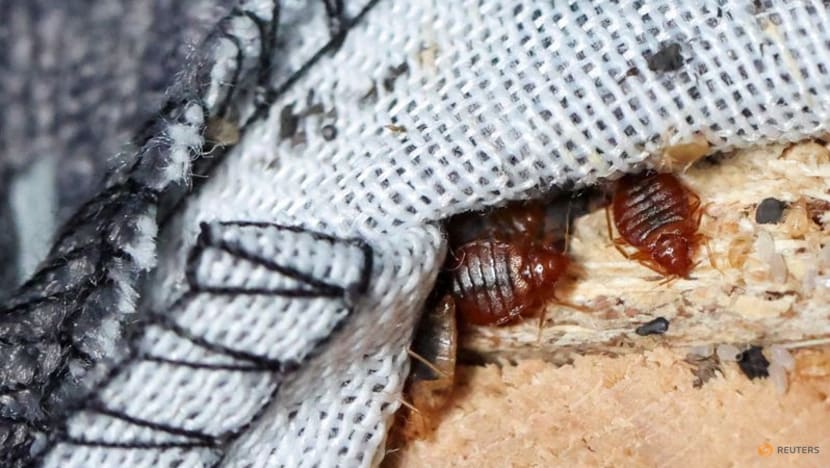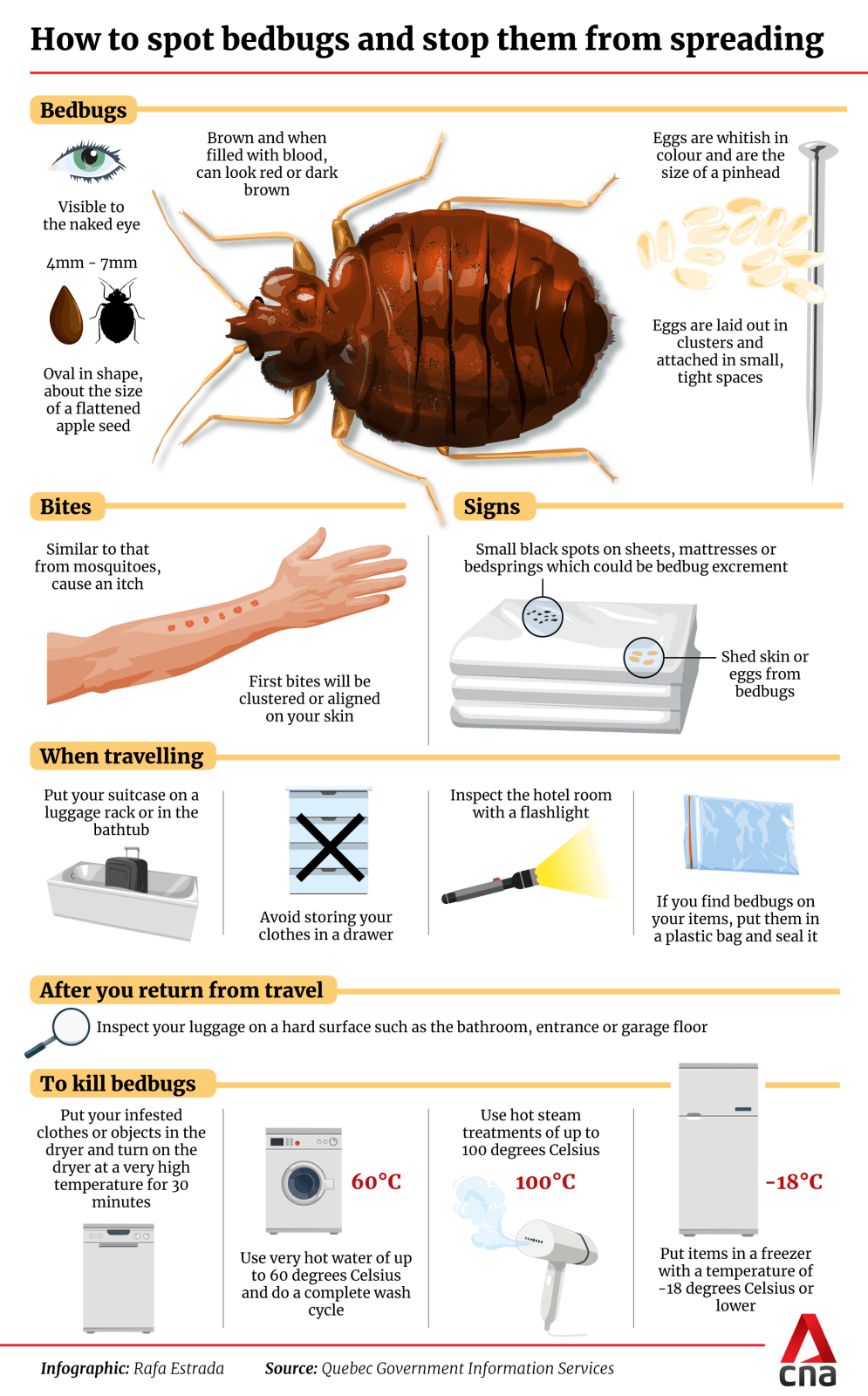CNA Explains: How to check for bedbugs when you travel – and avoid bringing them home
Worried you might get an unwelcome souvenir from a trip abroad?

Bedbugs seen in the seams of a sofa bed, in L'Hay-les-Roses, near Paris, France, Sep 29, 2023. (Photo: Reuters/Stephanie Lecocq)
SINGAPORE: Seen the news about a bedbug infestation in Paris? Or trending videos on TikTok of the pests scurrying out from under train seats in the City of Light?
With the French capital having recently hosted Fashion Week and the Rugby World Cup, there are growing fears of the bedbug problem spreading globally as visitors return home with the creepy-crawlies in their clothes and cases.
French authorities have insisted that not a single bedbug has been found by sniffer dogs deployed to the public metro. Yet reported sightings over in London prompted Mayor Sadiq Khan to state on Tuesday (Oct 10) that the situation was "a real source of concern".
For those who might be travelling to the affected regions, here’s what you can do to (try and) protect yourself from the little pests.
Related:
What harm do bedbugs cause?
Bedbugs feed mainly on the blood of humans. They are not known to spread disease.
Family doctor Lye Tong Fong said bedbug bites may be red and itchy like typical insect bites, and there are no serious complications for most people.
Symptoms can be resolved with oral antihistamines and calamine lotion.
It is “very rare” to go into anaphylactic shock because of an allergic reaction to bedbug bites, he added.
Those who scratch too hard at their bedbug bites may suffer from skin infections or lymphangitis, which is an infection spreading along the lymphatic system, said Dr Lye.
But these can happen to anyone with skin conditions that cause itching, including other common insect bites as well as eczema.
How can bedbugs be sniffed out?
The tiny critters are usually coloured black, dark brown or maroon.
Those that have recently fed on humans appear plump, while bedbugs that have not drawn blood for a while appear flat.
Their egg cases are translucent, pale yellow and about 1mm wide, which can make them difficult to spot.
In Paris, bedbugs have been reportedly spotted on public transport and in cinemas. But their main source? Hotel rooms, said Pestbusters general manager Angela Toh.
So before booking their hotels, travellers could check online reviews for previous cases of bedbugs, said Star Bugs CEO Andy Ma.
After entering the room, they should first check the bed by removing the bedsheets and looking closely at the seams of the mattress.
“Brush your fingers through, don’t be afraid to get bitten because the bedbugs don’t bite so fast. If there are any bedbugs, you’ll most probably push out some,” he added.

Signs of bedbugs include blood stains and their exoskeletons, which may look like wood shavings. Fecal spots or rust-coloured splotches may also be present.
Apart from the bed, other places to check - preferably with a torchlight - include the bed frame, furniture, electrical outlets, behind paintings, in closets and other nooks and crannies around the room.
“They are cave insects so they will actually hide in cracks, sometimes in the sofa, or around the corners of the room,” said Mr Ma.
Travellers can opt to leave their suitcases and clean clothes in the bathtub if there is one. This is because the surface of a tub is very smooth, and it will be difficult for bedbugs to get in, said Darian Ee, director of pest control firm Ikari Services and a spokesman for the Singapore Pest Management Association.
He noted that bedbug-proof cases for suitcases are available online.
If attacked by bedbugs, victims will usually see on their skin multiple bites grouped together in a zig-zag or straight line.
Experts said that in changing rooms, travellers should ask for one as far as possible from the infested room or on another floor altogether - because bedbugs are known to easily spread through walls.
The best option would be to change hotels.
Can bedbugs be killed by insect repellent?
Experts were split on whether store-bought insect repellents are effective against bedbugs.
Pestbusters' Ms Toh said home remedies like essential oils may help to prevent bedbugs from smelling the humans in the room, but they do little to deter them from eventually finding a subject to feed on.
“At the end of the day, if bedbugs really want to suck human blood, they can detect human warmth," she added, noting that the hardy creatures can survive without a blood meal for about nine months.
Diatomaceous earth, a white powder, will dehydrate bedbugs when they come into contact with them, said Mr Ee. This can be sprinkled in dark corners but should be purchased from reliable sources.
What else can be done after getting home?
Travellers back from their holidays can take extra steps to weed out any bedbugs that might have latched onto their clothes or suitcases.
They can unpack their luggage near the door, far away from bedrooms or any clothed surfaces like sofas and carpets.
Mr Ma from Star Bugs advised checking through each piece of clothing and the seams of luggage.
Clothes can also be immediately soaked in hot water - above 60 degrees Celsius - for at least 90 minutes, said Ms Toh.
After this, they can be put in the washing machine and dryer, where the heat will further ensure that any bedbugs left are killed.
For thicker winter clothes, sending them to a dry cleaning or laundry service is another option.















